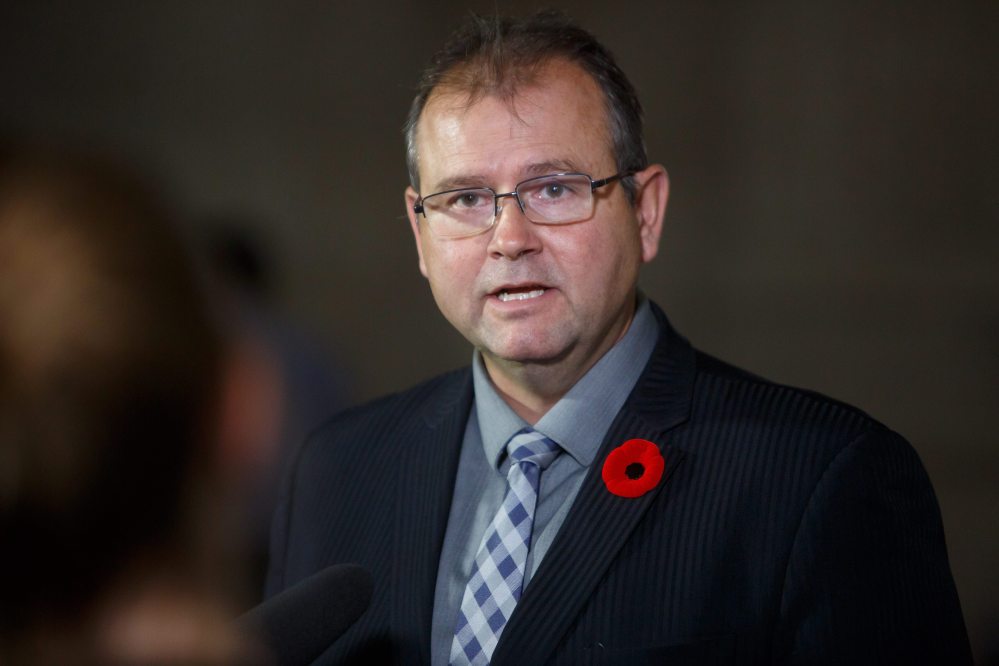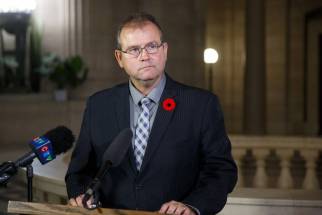Foot-dragging on teacher misconduct is unacceptable
Read this article for free:
or
Already have an account? Log in here »
To continue reading, please subscribe:
Monthly Digital Subscription
$0 for the first 4 weeks*
- Enjoy unlimited reading on winnipegfreepress.com
- Read the E-Edition, our digital replica newspaper
- Access News Break, our award-winning app
- Play interactive puzzles
*No charge for 4 weeks then price increases to the regular rate of $19.00 plus GST every four weeks. Offer available to new and qualified returning subscribers only. Cancel any time.
Monthly Digital Subscription
$4.75/week*
- Enjoy unlimited reading on winnipegfreepress.com
- Read the E-Edition, our digital replica newspaper
- Access News Break, our award-winning app
- Play interactive puzzles
*Billed as $19 plus GST every four weeks. Cancel any time.
To continue reading, please subscribe:
Add Free Press access to your Brandon Sun subscription for only an additional
$1 for the first 4 weeks*
*Your next subscription payment will increase by $1.00 and you will be charged $16.99 plus GST for four weeks. After four weeks, your payment will increase to $23.99 plus GST every four weeks.
Read unlimited articles for free today:
or
Already have an account? Log in here »
Hey there, time traveller!
This article was published 04/11/2022 (1136 days ago), so information in it may no longer be current.
Teachers are among the most formative and important adults in children’s lives. Educators don’t just teach kids the fundamentals of reading, writing and arithmetic; the best ones foster imagination, creativity and critical thought. Teachers teach our children how to be people in the world.
It’s a position of considerable trust. And when that trust is broken, there should be mechanisms for transparency and accountability.
This week, the Winnipeg-based Canadian Centre for Child Protection released a Canada-wide study of child sexual abuse in schools. It found at least 252 current or former K-12 personnel committed — or were accused of committing — offences against children between 2017 and 2021.
While data were not broken down by province, the report expressed particular ire for how Manitoba deals with teacher misconduct, echoing findings from a months-long Free Press investigation into the culture of secrecy blanketing teacher misconduct in this province that exposed major gaps in the system — including an absence of a centralized tracking system of cases.
The absence of data means it is difficult — nay, impossible – to attach actual numbers to a problem. Without such metrics, we don’t have a clear picture of just how bad a problem is, whether it’s getting worse or where it’s occurring. And that lack of data — that lack of a glaring, public spotlight — provides abusers many dark corners in which to hide, which in turn allows abuse to continue.
In cases of teacher misconduct in Manitoba, the public is often only made aware if parents, caregivers and victims themselves — often much later, when they are adults — elect to go to the media or if criminal charges are laid, as in the case of Kelsey McKay, the Winnipeg phys-ed teacher and high school football coach who faces a total of 30 charges relating to sexual abuse of students during his time at Vincent Massey Collegiate and Churchill High School.
The CCCP report has four sound recommendations for provinces and territories, including making cases of teacher discipline public, creating an independent oversight body, mandating sexual abuse prevention and awareness training for all school personnel (including administrators), and investing in trauma-informed support to students who have been victimized.

The provincial government’s response is typical. Education Minister Wayne Ewasko said the province is considering the creation of a teacher registry, as well as an independent body or college of educators, but has provided no firm commitments — and no timeline. It will hold “consultations with stakeholders,” even though the CCCP has, via its report, essentially delivered gift-wrapped recommendations Manitoba could start implementing.
There are also precedents set in other provinces. Ontario, Saskatchewan, Alberta, British Columbia and New Brunswick all make teacher discipline cases public.
A problem as big as this one — with reform that is this long overdue — requires immediate action. That the province is still in a “consideration and consultation” holding pattern is frustrating, especially since both the issue and the solutions — plural — are clear, as are the deleterious effects of non-action.
Some of the earliest lessons children learn in school — as early as kindergarten, in fact — are around responsibility, accountability and doing the right thing, even when it’s hard. Parents and students have a right to know who is in their classrooms, and the right to be protected from predation and abuse. It’s obvious current policies in place aren’t doing enough.
History
Updated on Friday, November 4, 2022 8:12 PM CDT: Removes unneeded word (it) from sentence









